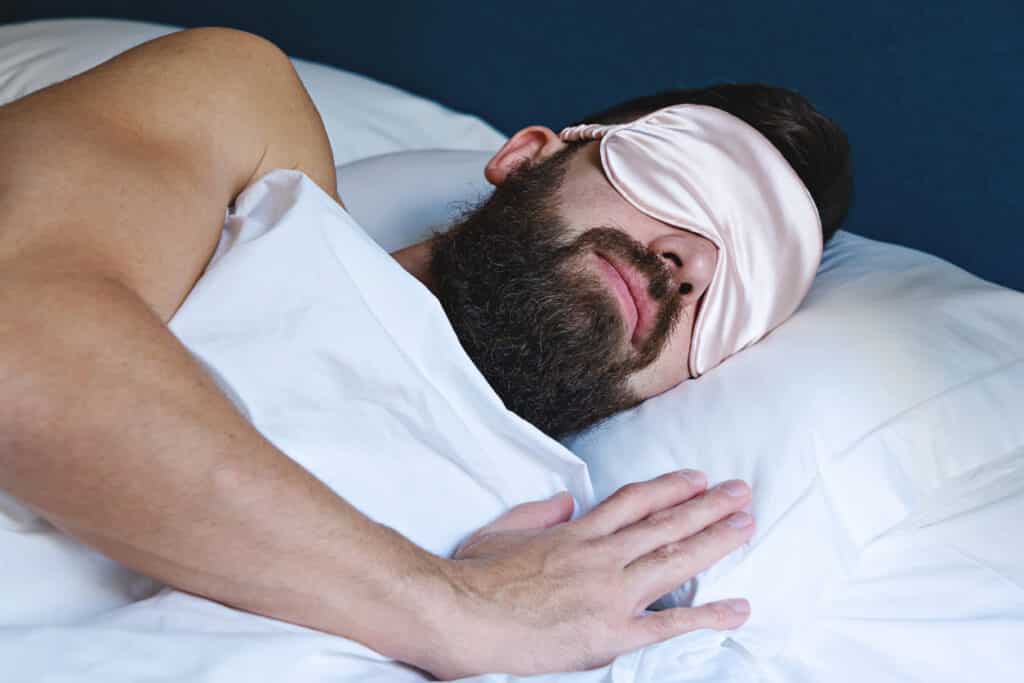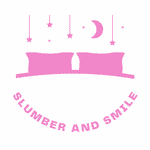Wearing a sleep mask can help you fall asleep faster and stay asleep longer. In fact, there are those who swear by them for a good night’s sleep. But is it safe to wear one all the time? Can sleep masks damage eyes? What are the risks of sleeping with a sleep mask on?
Find out how wearing a sleep mask can affect your eye health and what to do if you’re worried about it!
Generally speaking, as long as your sleep mask is properly fitting it will not cause any harm to your eyes. However, if you do not clean your sleep mask or if you tie it too tight, you may suffer from eye irritation, infection, and even blurry vision.

What do eye masks do?
If you have stumbled on this page without actually understanding why anyone would want to wear an eye mask to sleep, basically it is a cloth mask which you tie loosely around your head to block light from reaching your eyes.
Sleep masks work by preventing light from reaching your eyes. This is important as light can give your brain the impression that it’s time to be awake, or that there is stimulus it needs to respond to.People who struggle to get to sleep when it’s not totally dark often use a sleeping mask to block out light and help them stay asleep throughout the night.
Benefits of using an eye mask
Wearing sleep masks comes with a range of potential benefits, and some people simply can’t get to sleep without one.
Fall asleep faster:
As mentioned above, many people use eye masks to block out light and help them fall asleep faster. This is probably the main benefit of using an eye mask and the reason most sleeping masks are used for.
Sleep throughout the night
Many people have trouble sleeping or waking up constantly during the night. Using a sleep mask can help with this because it blocks out light, helping your body from going into a lighter stage of sleep. This allows you to stay asleep throughout the night without waking up as frequently.
Promote sleep quality
Using a sleeping mask may also promote sleep quality. This is because during the night, particularly in the early stages of your sleep cycle, your eyes move around behind closed eyelids. Blocking out light can help you stay on track with your body’s natural rhythms and promote better sleep quality overall.
Read also: How to sleep near a busy street.
Can sleep masks help you sleep?
Wearing a sleep mask provides complete darkness, which promotes restful sleep by allowing they body’s natural hormone production to take place.
Excessive light at night can interrupt the production of melatonin, which has an important impact on your circadian rhythm and the normal cell regeneration process that happens while you sleep.
That’s why the total darkness provided by eye covers will help you get a good night’s rest. Good sleeping habits include wearing an eye mask to bed if there is too much light getting to your eyes.
Sleep mask side effects
Unfortunately, in rare cases it’s possible to experience some side effects from wearing an eye mask to bed. If you do have any concerns at all, visit an eye doctor for specialist advice.
Skin irritation:
Skin irritation around your eyes after using a sleeping eye mask could be the result of either an allergic reaction or possibly a dirty mask. Most sleeping masks are made from hypoallergenic materials, which should not cause any irritation.
If you do experience spots, soreness or itchiness from wearing your mask, make sure it is hypoallergenic and make sure to wash it regularly as per the manufacturer’s instructions.
Alternatively, if your eye mask is rubbing tightly against your skin when you move in the night, you may experience eye irritation from this rubbing.
Eye infection:
Eye infection is an unusual side effect of wearing an eye mask to bed, but it can occur if dirt and grime comes into contact with your eyes. That’s why it’s important to always cleanse your face before bed, and ensure that your eye mask is regularly washed.
Blurry vision:
Very few people will experience blurry vision from wearing a sleep mask, but if you do get blurry vision or eye pain, seek expert medical advice immediately.
Blurred vision can result from tying your sleep mask too tight around your head, putting pressure on your eyes throughout the night. Remember to always tie your mask as loosely as possible and that you should be able to move it from side to side without friction or ‘pulling’ hard.
Can sleep masks make you more tired?
A sleep mask will not make you more tired unless you are finding it uncomfortable to wear. If you have a properly fitting, padded, hypoallergenic eye mask, then you are almost certainly going to get better quality sleep with it than without it.
Can sleep masks cause styes?
Sleep masks can make you more prone to styes if they rub against the delicate area of skin around your eyes. Make sure your eye masks fits you comfortably, even when you move, and invest in a padded sleep mask to reduce the risk of styes.
Can sleep masks cause dry eyes?
A poorly fitting mask can pull the lids of your eyes slightly apart, allowing for your lower eyelid to be exposed. As your lower lid has a delicate membrane which provides liquid to the eye, if it gets too much air it can dry out and cause dry eyes and irritation.
The solution is to make sure that your eye mask isn’t too tight and is allowing your eyes and eyelids to move freely under it.
Can sleep masks cause pink eye
Pink eye is a sign of eye infection which may be a result of wearing a dirty eye mask to bed.
Can sleep masks cause headaches?
If you experience headaches then it’s unlikely to be caused by your sleep mask. Instead, check for other common headache causes and speak to your doctor.
Some sleep masks can actually help alleviate headaches. Check out heated eye masks and cooling eye masks for some quick and easy relief.
Can sleep masks cause wrinkles?
Anything which creates too much friction on the delicate skin around your eyes can cause wrinkles. Again, it’s so important to ensure that your mask isn’t too tight, or else you may indeed find that you are speeding up your skin aging!
Can sleep masks damage eyelashes?
Because a sleep mask places pressure on your eyelashes as they grow, it can cause them to grow in strange directions or can even break or rub your eyelashes so that they fall out.
One easy fix for this is to wear a contoured sleep mask which has space for your eyelashes (or extensions) to sit without any weight against them.
Can sleep masks damage hair?
Good quality sleeping masks won’t damage your hair as they use silky fabrics to tie around the back of your head. However, cheaper elasticated sleeping masks can cause minor damage to your hair if it moves and drags over your hair in the night.
Can sleep masks cause dark circles?
No, sleep masks will not cause dark circles under your eyes. In fact, one of the leading causes of dark circles is lack of sleep, or lack of quality sleep. As wearing sleep masks promotes good sleep, you are actually less likely to have this problem than if you don’t wear one.
Can sleep masks give you acne?
Build up of sweat, dirt and make up on your sleep mask can cause acne and skin breakouts around the mask area. Cleaning your mask regularly will minimise the chance of this happening.
Can sleep masks prevent sleep paralysis?
Sleep paralysis is a frightening phenomenon that happens to some people when their conscious mind ‘wakes up’ but their body is temporarily still ‘asleep’. There is no evidence to suggest that this condition is linked with eye masks in any way and people either experience sleep paralysis or they do not (with or without a mask).
Can I use a sleeping mask every night?
Some people find a sleep mask to be a comfortable and effective sleeping aid, while others do not. If you feel the benefits outweigh the risks, then there is no reason why wearing one every night would be harmful for your eyes.
Several kinds of masks exist on the market, from those made with soft cotton or silk encasing a thin polyester filling that blocks light well, to more elaborate masks containing contoured plastic pieces and foam padding that fit the curves of your face. If you wear a mask of either type every night for many years, it may stretch or injure the skin of your face near your eyes.
Possible risks include:
– Skin irritation from marks left on the face
– Difficulty finding a good fit for your face shape
– Skin aging or wrinkling, due to incorrect size or fit; skin elasticity decreases with age, so this is certainly something to look out for
Other problems are more serious. If you wear your mask too tightly it can cause headaches, sinus pain, or it can even damage the blood vessels in your face.
The biggest risk is if you wear a mask that presses on your closed eyelids. The only way to truly know what this feels like is to experiment with different kinds of masks (test them for comfort) and find one with a delicate touch before trying it at night. Ask others for recommendations, or visit a store that carries them to try some on.
If you are unsure whether your mask is too tight, it probably is. The ideal fit for sleeping masks would be just snug enough to keep the mask from falling off but not so tight that the mask pushes against the lids of your eyes, causing pressure and discomfort.
For those with sensitive eyes:
– Try a mask made of silk instead, which will block any light and is highly breathable
– Look for masks that offer fully adjustable soft straps or adhesive eye patches rather than tight elastic bands that can irritate around your eyes
– Consider the mask’s material. Rigid plastic may not sit well against the skin, but soft fabrics are usually more comfortable to wear under a mask. Some masks include contoured plastic inserts for good fit and comfort
To make sure you are getting adequate restful sleep at night despite wearing a sleeping mask, take other steps to enhance your sleep. For example, try using a white noise machine in the bedroom or wearing earplugs if loud sounds awaken you. You could also try out one of your best teas for sleep to set you up for a restful night.
